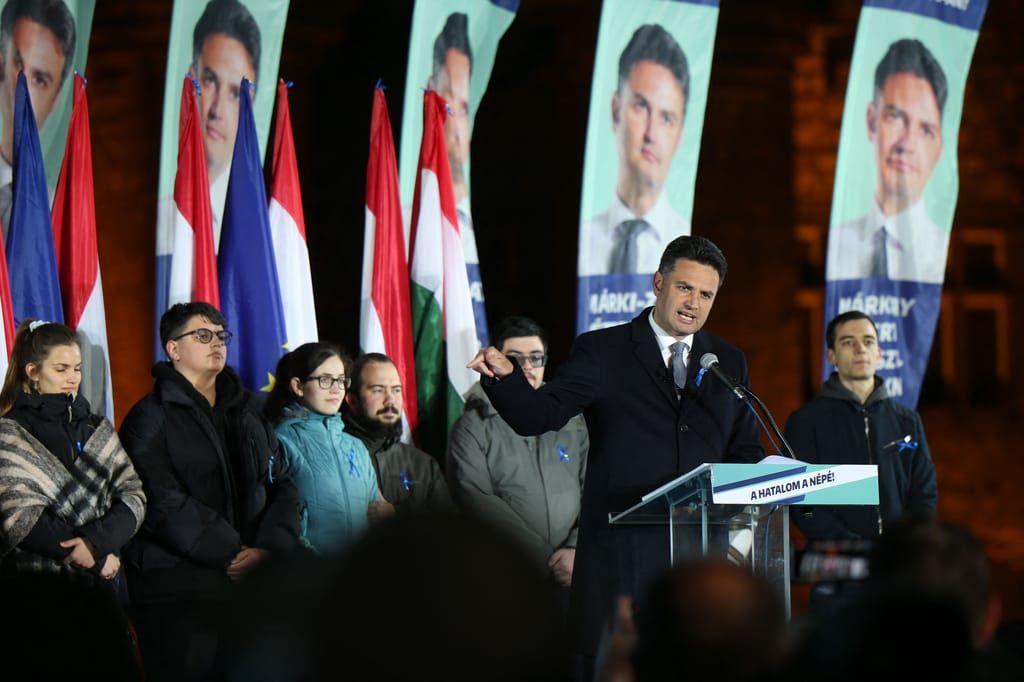
A philosopher’s death and the two realities of Orbán’s Hungary
The afternoon was cold. Yet hundreds of people had gathered on the edge of Hungary’s capital to bid farewell to one of their own: philosopher Gáspár Miklós Tamás.
There were Communist-era dissidents, current politicians, writers, journalists and young activists — a crowd that told the story of Budapest over the last four decades, and formed the seed of opposition today against far-right Hungarian Prime Minister Viktor Orbán. They convened quietly in the Farkasréti cemetery.
To some, Tamás was a brother in dissent from the 1980s in Budapest, when he was active in an underground democracy movement. To a younger generation, the Transylvanian-born Marxist thinker and academic was also a beloved speaker at protests and events, where he excoriated Orbán. He was, one Hungarian outlet said, an intellectual “rock star.”
But as the crowd dispersed — after eulogies from the mayor of Budapest and some of the city’s best-known figures — the mourners bumped into other locals, who live in a seemingly different Hungary.
“Whose funeral was it?” asked a flummoxed fellow passenger as mourners tried to squeeze into a public bus back to the city’s center.
The question echoed an emerging reality — or perhaps a double reality — in Orbán’s Hungary. There is increasingly one group of people living within an Orbán-curated narrative, and another group living outside of it.
It’s a dichotomy Orbán both created — by extending his influence into Hungary’s media, judiciary, education system and arts — and also straddles. The Hungarian leader was once himself a liberal dissident, moving in the same circles as Tamás, before tacking hard to the nationalist right.
That’s why Tamás’ passing inadvertently pierced this growing chasm when Orbán posted a photo of the late intellectual on Facebook, paying respects to his (ex) friend.
“The old freedom fighter has gone,” the prime minister wrote, referring to Tamás as simply TGM — the writer’s ubiquitous byline.
Who, asked some of the prime minister’s supporters in the comments section, is TGM? Can someone explain?
Others were confused why Orbán was suddenly honoring someone so ideologically opposed to his government. Some offered their condolences anyway.
Tamás’ fans, meanwhile, were outraged. How dare Orbán, whose government vilifies critics as traitors on a daily basis, post about their beloved philosopher as an “old” fighter?
 Some were confused why Hungarian Prime Minister Viktor Orbán was
suddenly honoring someone so ideologically opposed to his government
Some were confused why Hungarian Prime Minister Viktor Orbán was
suddenly honoring someone so ideologically opposed to his government
The prime minister, he argued, “has no principles” — and his political positioning is merely opportunism.
Whatever Orbán may feel in private, he has gone to great lengths to discredit opponents. His party has taken control of state media and spreads conspiracy theories portraying any opponent as working to undermine Hungary’s national interest.
The result has been to amplify Hungary’s deepening polarization — and the emergence of two parallel bubbles in the country.
In the capital city and some other urban pockets, many Hungarians believe Orbán is wrecking Hungarian democracy. They want a strong relationship with the EU and an end to high-level corruption.
But elsewhere, in particular in the countryside and some smaller towns, Orbán enjoys solid support — despite high inflation. Many of the prime minister’s supporters blame the U.S. and Ukraine for the ongoing war and believe the narrative that Brussels and shadowy interests are out to destroy Hungary.
In these places, many Hungarians don’t read news that is not filtered by the ruling Fidesz party, which has worked to exert influence over most of the country’s institutions. The government has also lined Hungary’s streets and highways with billboards — all paid for with taxpayer money — pushing misleading and degrading messages about the strident EU sanctions against Russia.
“97 percent not for sanctions,” declares one current government video ad. “The time is here that finally in Brussels they will also hear the voice of the people.”
The government’s anti-sanctions rhetoric is so pervasive that many citizens — a full 50 percent of Fidesz supporters, according to a poll late last year — are under the impression that Hungary has actively opposed them. The opposite is true. Budapest has approved every package currently in force.
But beyond his party’s strong influence over the flow of information, there are still questions over why Orbán is still successful, at least within one bubble, given the tough state of Hungary’s economy and the visible enrichment of people linked to the ruling party.
Hungary’s opposition struggled in the 2022 election, winning merely 34 percent of the popular vote. Tamás had criticized the opposition coalition in that race as a “product of despair” that wasn’t presenting a sufficiently clear alternative.
Asked why the prime minister was so successful in appealing to his political base, Tamás told POLITICO a few years ago that Orbán had capitalized on a voter base that already existed within Hungarian society.
 Hungary’s opposition struggled in the 2022 election, winning merely 34 percent of the popular vote
Hungary’s opposition struggled in the 2022 election, winning merely 34 percent of the popular vote
“Coming from the outside — he used to be an anti-nationalist and anti-clericalist left liberal before — he managed to re-unite the fragmented right and give it self-confidence,” Tamás said.
“There was,” he added, “a large right-wing voting base, but unorganized; they needed a leader.”
Another important factor, according to the late philosopher, is Orbán’s “courage in using the long dormant anti-Western resentment, an essential part of Hungarian and East European politics since the defeat of the 1848 liberal revolutions.”
In far-right and nationalist circles, for example, Western powers are blamed for Hungary’s loss of territory following World War I.
Orbán’s use of anti-Western rhetoric, Tamás said, is “in keeping with the main tradition” and “this is why he’s forgiven by his supporters — in spite of corruption.”
“He’s familiar,” he said, “as a type of national leader — more than anyone else in recent history.”











